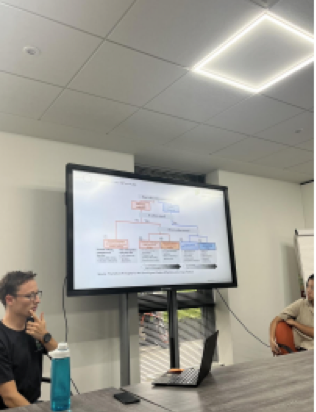Carbon Capture and Management During Burch Cleantech Europe Trip
July 19, 2023
The Honors Carolina Burch Sustainability Seminar has officially made it to our final week in Europe. With the past three weeks focused primarily on renewable energy and clean technology, we traveled to Oxford to spend our last company visit with CyanoCapture. This carbon capture company aims to provide affordable, long-term carbon capture on an industrial scale by harnessing genetically modified cyanobacteria.
The meeting started when the founder and CEO, David Kim, introduced CyanoCapture and its purpose. David emphasized the statistics; we produce 40 billion tons of CO2 as a planet each year, but only 0.1% of that is captured. According to the IPCC, we need that number to be 40% by 2030. Unfortunately, carbon capture is inherently difficult as you need to go uphill against entropy. Companies and startups have started to pour a lot of money into different technologies, but CyanoCapture has advocated for biology as a unique solution.
Jane Harrowell, a research scientist from the team, then gave a presentation discussing “Why cyanobacteria?” and “Six reasons why biology can unlock carbon capture.” CyanoCapture focuses primarily on Synechococcus because there are many varieties and they can grow in various environments, such as saltwater and estuaries. Jane also mentioned aspects that contribute to upscaling: photosynthetic abilities, genetic modifications, low energy process, wastewater utilization, low cost, and product production.
Next, our cohort split into three groups of seven so we could divide up a lab tour, a presentation about the biology behind CyanoCapture, and a presentation regarding different carbon management technologies.
During the lab tour, we saw the collaboration between young students and entrepreneurs firsthand. We learned that CyanoCapture is a pioneer in light for bacteria, looking at different photobioreactor systems (PBRs) to monitor the effect different environments have on bacteria growth and light penetration.
The office presentation dove deeper into the issues of scaling up to industry size. We learned more about CyanoCapture’s upscaling process and life cycle analysis. Although they are still in the pilot stage, CyanoCapture expects only a couple more years of research to scale to the industry.

Finally, our day wrapped up with a talk by David Evans (head of commercial) on carbon management technologies. With a background in finance, private equity, and venture capital, David Evans walked our group through the processes of direct air capture (DAC), trees and seagrass, and bioenergy with carbon capture and storage (BECCS).

Our meeting wrapped up, and our group discussed takeaways for the United States and the Research Triangle Park. Ultimately, we concluded that to amplify innovation in the carbon management sector, the United States must join universities with the private sector.
About the Author
This article was written by Stephanie Deihl, Class of 2025, majoring in Environmental Studies Sustainability and AD/PR majors.
